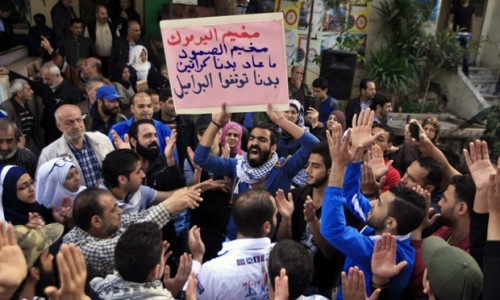PHOTO: Palestinians in refugee camp near Sidon in Lebanon protest with placard “Yarmouk Camp…We need you to stop the barrel bombs” (Mohammed Zaatari/AP)
LATEST
- Rebels Attack Regime Positions in Aleppo City
- Regime Orders Exporters to Sell All Foreign Currency to Central Bank
UN officials have issued another warning about the worsening humanitarian crisis in Yarmouk in southern Damascus, amid fighting spurred by the Islamic State’s entry into the area on April 1.
Christopher Gunness, a spokesman for the UN Relief and Works Agency, said:
The violence that began in Yarmouk…is not just continuing, it has intensified. The world community must not stand by as a silent witness to what the UN Secretary General has warned could be a massacre. Yarmouk is at the lower reaches of hell. It must not be allowed to descend further.
On Thursday, Secretary-General Ban Ki-Moon warned that a refugee camp is beginning to resemble a death camp” with about 15,000 remaining residents — mainly Palestinian refugees — “being turned into human shields”.
He condemned both the violence and the Syrian military’s siege, imposed on Yarmouk after rebels established themselves in the area in July 2012, “[They] face a double-edged sword — armed elements inside the camp, and government forces outside.”
The fighting began last week following the assassination of a prominent Palestinian activist who ran an education and training program in Yarmouk. The Palestinian faction Aknaf Beit al-Maqdis detained about 10 Islamic State fighters, prompting the jihadists to attack from the suburb of al-Hajar al-Aswad to the south of Yarmouk.
Some Palestinian factions and rebels have tried to check the Islamic State, which now occupies the majority of Yarmouk. Meanwhile, the Syrian military has used dozens of barrel bombs and shelled the camp — targeting the defenders of the camp rather than the jihadists, according to opposition activists.
The UN’s Gunness said that the inability to gain access to Yarmouk “is putting 18,000 Palestinian and Syrian men, women and children at grave risks, as they remain unable to meet their most basic food, water and health care needs, in a context of relentless fighting”.
The UN reportedly evacuated about 100 residents, while hundreds others have been able to flee to nearby rebel-held suburbs.
Meanwhile, a senior Palestine Liberation Organisation official said the PLO’s envoy to Damascus may be disciplined after he joined regime ministers in a call for a ground offensive into Yarmouk.
Ahmed Majdalani, the former Labor Minister for the Palestinian Authority, met President Assad’s officials this week. On Thursday, he supported the statement of the Syrian Reconciliation Minister for a “joint operation centre” to coordinate an offensive against the Islamic State.
The senior PLO official said that members of the Palestinian executive body were “very upset” with Majdalani’s breaking of the PLO’s official line of neutrality. He claimed Majdalani did so because he heads the Palestinian Popular Struggle Front, which supports the Assad regime.
Rebels Attack Regime Positions in Aleppo City
Both rebel and pro-Assad outlets report opposition attacks on regime areas inside Aleppo city.
Rebels attacked Bab Hadeed with mortars, rockets, and a ground assault on Friday, with fighting continuing late into the evening. The Free Syrian Army claimed the capture of the Bawabet al-Fateh area of the Old City, while the rebel coalition also stormed a regime checkpoint in Maysaloun and bombarded the regime part of Suleimaniyah.
State TV said nine people had been killed in Suleimaniyeh and other areas, broadcasting pictures of heavily-damaged buildings and streets strewn with rubble. It said dozens were trapped in the destruction.
Syria’s Grand Mufti Ahmed Badr al-Din al-Hassoun, speaking on state TV, called for the destruction of insurgent-held areas from which shells were being fired.
“We inform the civilians there, be they supporters (of the insurgents), or not, to leave the area. Every area from which a shell is fired, should be completely destroyed,” he said.
Regime Orders Exporters to Sell All Foreign Currency to Central Bank
In a sign of the worsening currency crisis, the Assad regime has ordered exporters to sell all foreign currency revenues to the Central Bank.
Bank Governor Adib Mayyaleh issued an order raising the required sale from 50% of revenues to 100%. He said that the decision was “prompted by the latest economic developments and the drop in the price of the Syrian Pound against the US dollar”.
Amid recent military defeats, production problems, and shortages, the Pound has fallen further in the past month. The official level is just under 200:1 vs. the US dollar; however, the unofficial trading rate is far higher, with reports of the Pound touching 280:1 about two weeks ago after the fall of Idlib city to rebels.
Mayyaleh said that exporters will be granted bonuses in exchange for the foreign currency revenues.

